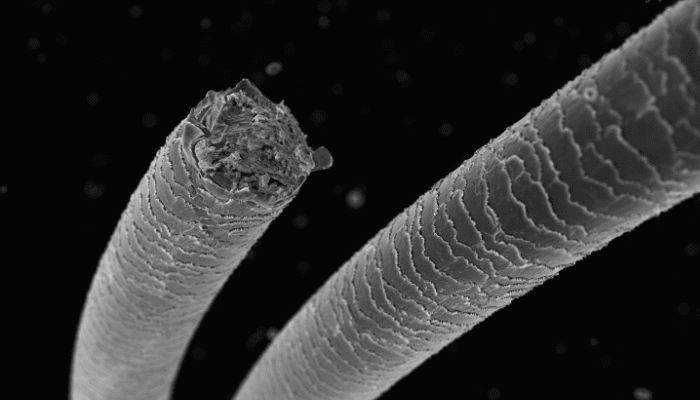
Can Stress Affect Hair Growth? Harvard University researchers have made a groundbreaking discovery that unveils the connection between stress and hair growth. Their study reveals that chronic stress can impair hair follicle stem cells, ultimately leading to hair loss. This finding confirms what has long been observed, that stress can indeed affect hair growth. Stress and hair loss are connected.
Can Stress Affect Hair Growth? – Key Bullet Points:
- Chronic stress has been found to impair hair follicle stem cells, contributing to hair loss.
- Harvard University researchers identified the biological mechanism behind this phenomenon.
- Stress hormones, such as cortisol, play a role in inhibiting the activation of stem cells.
- Understanding the impact of stress on hair follicle stem cells may lead to new therapies for stress-induced hair loss.
- Managing stress is crucial for maintaining optimal hair health.
Understanding Hair Growth Cycles and Stem Cells
The process of hair growth is governed by a series of cycles, which are regulated by the activity of hair follicle stem cells. These stem cells play a crucial role in the regeneration of hair follicles and the production of new hair strands. To understand the impact of stress on hair growth, it is important to delve into the intricacies of the hair growth cycle and the role of stem cells.
The hair growth cycle consists of three main phases: anagen (growth phase), catagen (transition phase), and telogen (resting phase). During the anagen phase, hair follicle stem cells activate and divide, leading to the production of new hair cells. This results in longer hair strands. The catagen phase is a brief period of regression where the hair follicle regresses and detaches from the blood supply. Finally, the telogen phase is the resting phase where the hair strand is shed, and the hair follicle remains dormant until the next cycle begins.
Hair loss can occur when there is an imbalance in the hair growth cycle, particularly during the telogen phase. If the hair follicle stem cells do not activate and regenerate new tissue, the hair follicle remains dormant, leading to hair loss. Chronic stress has been found to disrupt the activation of hair follicle stem cells, keeping them in a resting phase for an extended period. This inhibition of stem cell activation can contribute to hair loss and thinning.

Stages of the Hair Growth Cycle:
- Anagen Phase: The growth phase where hair follicle stem cells activate and divide, leading to the production of new hair strands.
- Catagen Phase: A short transition phase where the hair follicle regresses and detaches from the blood supply.
- Telogen Phase: The resting phase where the hair strand is shed, and the hair follicle remains dormant until the next cycle begins.
Role of Hair Follicle Stem Cells:
Hair follicle stem cells are responsible for the regeneration and maintenance of hair follicles. During the anagen phase, these stem cells activate and divide, leading to the growth of new hair strands. However, chronic stress can disrupt the activation of hair follicle stem cells, keeping them in a resting phase and inhibiting hair regeneration. Understanding the relationship between stress and hair follicle stem cells is crucial in unraveling the mechanisms behind stress-induced hair loss and developing potential interventions.
| Hair Growth Cycle | Summary |
|---|---|
| Anagen Phase | Hair follicle stem cells activate and produce new hair strands. |
| Catagen Phase | Short transition phase where the hair follicle regresses. |
| Telogen Phase | Resting phase where the hair strand sheds and the hair follicle remains dormant. |
The Impact of Chronic Stress on Hair Follicle Stem Cells
Chronic hair growth and stress has been found to have a significant impact on hair follicle stem cells, leading to potential hair loss. Research conducted at Harvard University has shown that stress can keep these stem cells in a resting phase for a prolonged period, inhibiting their activation and impairing hair growth.
In the presence of chronic stress, a major stress hormone, such as cortisol in humans, can upregulate and prevent the activation of hair follicle stem cells. This disruption in the natural hair growth cycle can result in a delay in follicle regeneration, leading to hair loss.
| Effects of Chronic Stress on Hair Follicle Stem Cells | Causes |
|---|---|
| Prolonged resting phase of stem cells | Upregulation of stress hormones |
| Inhibited hair follicle regeneration | Impact of cortisol and other stress hormones |
| Potential hair loss | Disruption of the natural hair growth cycle |
Understanding the impact of chronic stress on hair follicle stem cells is crucial in unraveling the connection between stress and hair growth. This research provides valuable insights into the underlying mechanisms and paves the way for future studies and potential interventions to counteract stress-induced hair loss.
The Role of Gas6 in Hair Growth Regulation
Gas6, or growth arrest-specific 6, is a crucial molecule that plays a significant role in the regulation of hair growth. Secreted by dermal papilla cells located underneath the hair follicle, Gas6 is involved in activating hair follicle stem cells during the resting phase of the hair growth cycle. This activation leads to the regeneration of the hair follicle and the promotion of hair growth. However, chronic stress has been found to inhibit the secretion of Gas6, disrupting the activation of stem cells and impairing the natural hair growth process.
Understanding the role of Gas6 in hair growth regulation is important for developing potential therapies to counter stress-induced hair loss. Researchers are exploring the pathways and mechanisms through which Gas6 interacts with hair follicle stem cells. By determining how Gas6 promotes hair growth, scientists can identify strategies to restore Gas6 secretion, activate stem cells, and reverse the effects of stress on hair follicle health.
To illustrate the importance of Gas6 in hair growth regulation, consider the following table:
| Growth Phase | Resting Phase |
|---|---|
| Gas6 secretion is high, activating hair follicle stem cells | Gas6 secretion is inhibited under chronic stress, preventing stem cell activation |
| Hair follicles regenerate and promote hair growth | Hair follicles remain in a resting phase, leading to hair loss |
As shown in the table, during the growth phase of the hair follicle cycle, Gas6 secretion is high, enabling the activation of hair follicle stem cells and the regeneration of hair follicles. In contrast, during the resting phase, chronic stress inhibits Gas6 secretion, preventing stem cell activation and resulting in hair loss. By restoring Gas6 secretion, it may be possible to counteract the negative effects of stress on hair growth and promote healthy hair follicle function.
Mouse Study Reveals the Impact of Stress Hormones on Hair Follicle Stem Cells
A recent mouse study provided valuable insights into how stress hormones can affect hair follicle stem cells, shedding light on the connection between stress and hair growth. Researchers found that chronic stress, such as the upregulation of stress hormones like corticosterone, can put hair follicle stem cells into an extended resting phase. This prolonged resting phase inhibits the activation of stem cells, preventing hair growth.
The study observed that when the source of stress hormones was removed, the resting phase of stem cells became extremely short, causing the mice to constantly enter the growth phase and regenerate hair follicles throughout their life. This finding suggests that stress hormones play a significant role in regulating the activity of hair follicle stem cells, ultimately impacting hair growth.
In understanding the impact of stress hormones on hair follicle stem cells, researchers are making progress towards identifying potential therapeutic targets for managing stress-induced hair loss. By further exploring the mechanisms behind stress hormone regulation and its effects on stem cells, scientists aim to develop interventions that can promote hair growth and counteract the negative impacts of chronic stress.
| Mouse Study Highlights | Key Findings |
|---|---|
| Stress Hormones | The upregulation of stress hormones like corticosterone can put hair follicle stem cells into an extended resting phase. |
| Resting Phase | The resting phase of stem cells becomes extremely short when the source of stress hormones is removed, leading to continuous hair follicle regeneration. |
| Potential Therapies | Understanding the impact of stress hormones on hair follicle stem cells opens avenues for developing interventions that can promote hair growth. |
This mouse study serves as a stepping stone towards unraveling the complex relationship between stress hormones and hair follicle stem cells. Further research is needed to translate these findings into human applications and develop targeted therapies for stress-induced hair loss. By deepening our understanding of how stress hormones affect hair growth at a cellular level, scientists are making progress towards improving overall hair health and well-being.
The Potential of Gas6 Pathway in Hair Growth Promotion
The Gas6 pathway, which involves the activation of hair follicle stem cells through the secretion of Gas6, holds tremendous potential for promoting hair growth. Research has shown that by adding Gas6, stem cells in the resting phase can be activated, leading to enhanced hair growth. This discovery opens up new possibilities for developing therapies that target the activation of stem cells and promote hair growth, especially in the context of stress-induced hair loss.
Studies have demonstrated that Gas6 plays a crucial role in regulating the hair growth cycle. When hair follicle stem cells remain quiescent during the resting phase, the addition of Gas6 can trigger their activation, resulting in hair regeneration. By understanding the mechanisms underlying the Gas6 pathway, scientists are exploring ways to harness its potential for promoting hair growth and reversing the effects of stress-induced hair loss.
Gas6 Pathway Mechanisms
The Gas6 pathway operates through the secretion of Gas6 by dermal papilla cells, which are located beneath the hair follicle. Gas6 works by activating hair follicle stem cells during the resting phase, ensuring their transition into the growth phase. This activation leads to the regeneration of hair follicles and the promotion of hair growth. However, chronic stress has been found to inhibit the secretion of Gas6, thereby compromising the activation of stem cells and impairing hair growth.
By studying the mechanisms of the Gas6 pathway, researchers aim to identify potential targets for therapeutic interventions. Manipulating the Gas6 signaling pathway could provide a way to overcome the inhibitory effects of chronic stress on hair follicle stem cells and restore normal hair growth. Ongoing research in this field is focused on understanding the intricate mechanisms of the Gas6 pathway and developing strategies to enhance hair growth through its manipulation.
| Gas6 Pathway in Hair Growth Promotion | Implications |
|---|---|
| Activation of hair follicle stem cells | Potential therapeutic target for stress-induced hair loss |
| Stimulation of hair regeneration | Promising avenue for promoting hair growth |
| Compromised by chronic stress | Understanding stress-induced hair loss mechanisms |
By exploring the potential of the Gas6 pathway in hair growth promotion, scientists are striving to develop effective treatments for stress-induced hair loss. However, further research is needed to fully comprehend the complex mechanisms involved and ensure the safety and efficacy of targeting the Gas6 pathway in humans. The Gas6 pathway offers hope for individuals suffering from hair loss due to stress, pointing toward future innovations in the field of hair restoration.
Implications for Understanding Stem Cell Biology and Tissue Interactions
The research on stress and hair follicle stem cells has significant implications for our understanding of stem cell biology and tissue interactions. By studying how chronic stress affects hair follicle stem cells, researchers gain valuable insights into the behavior of stem cells in other tissues and organs. This knowledge helps us understand the interconnectedness between different body systems and the role of systemic factors in regulating stem cell function.
Stem cell biology is a rapidly evolving field, and unraveling the complex interactions between stem cells and their microenvironment is crucial for advancing regenerative medicine and tissue engineering. The study on hair follicle stem cells adds to our understanding of stem cell behavior, as these cells are an excellent model for investigating how stem cells respond to external stimuli and regenerate tissue.
Moreover, the research highlights the importance of tissue interactions in the context of stem cell biology. The hair follicle microenvironment, which includes dermal papilla cells and other neighboring cells, plays a vital role in regulating hair growth and stem cell activity. Understanding these tissue interactions can help us develop strategies to enhance stem cell function in various regenerative medicine applications.
Looking Ahead: Future Directions in Stem Cell Research
The findings from hair follicle stem cell research open up exciting avenues for future research in the field of stem cell biology. Scientists can build upon this knowledge to explore how other systemic factors, such as hormones or environmental cues, influence stem cell behavior in different tissues throughout the body.
Additionally, the insights gained from studying stress and hair follicle stem cells can inform the development of therapeutic interventions for various conditions, including stress-induced hair loss. By understanding the molecular mechanisms behind hair follicle stem cell regulation, researchers can potentially identify targets for promoting hair growth and develop novel therapies.
The field of stem cell biology holds immense promise for regenerative medicine and tissue engineering. Continued research into the biology of stem cells, their micro environment, and the influence of external factors will help unlock the full potential of stem cell-based therapies, leading to innovative treatments for a wide range of diseases and conditions.

The Link Between Stress and Hair-related Changes
Stress has been identified as a significant factor contributing to various hair-related changes, including hair loss and premature graying. The mechanisms behind these effects are complex and involve different types of stem cells. Stress not only impacts hair follicle stem cells, but it also affects melanocyte stem cells responsible for hair pigment regeneration.
Stress-Related Hair Loss: Chronic stress can lead to hair loss by preventing hair follicle stem cells from generating new hairs. This is achieved through the release of stress hormones, such as cortisol, which inhibit the activation of these stem cells. As a result, hair follicles enter an extended resting phase, leading to a decline in hair growth and an increased likelihood of hair loss.
Hair Graying: Stress can also contribute to premature graying of hair. While the exact mechanisms are not fully understood, research suggests that stress depletes melanocyte stem cells directly through nerve-derived signals. This depletion of melanocyte stem cells leads to a loss of hair pigment and the appearance of gray or white hair.
To fully grasp the impact of stress on hair-related changes, further research is needed. Understanding the intricate relationship between stress and these stem cells is crucial for developing effective interventions and treatments for stress-induced hair loss and premature graying.
“Chronic stress can significantly impact our hair health, affecting not only the growth of new hairs but also the pigmentation of existing ones. By recognizing the link between stress and hair-related changes, we can develop strategies to manage stress effectively and minimize its impact on our hair.”
Table: The Effects of Stress on Hair-related Changes
| Impact | Effect |
|---|---|
| Hair Loss | Prevents hair follicle stem cells from generating new hairs, leading to hair loss. |
| Hair Graying | Depletes melanocyte stem cells responsible for hair pigment regeneration, resulting in premature graying. |
Human Application and Future Research
While the initial findings from the mouse studies are promising, further research is needed to better understand the implications of stress on hair growth in humans. It is crucial to ensure the safety and efficacy of potential interventions before applying them to human subjects. Researchers are actively exploring opportunities for future studies to bridge the gap between the laboratory findings and real-world applications.
Future research in this area may focus on investigating the specific mechanisms by which stress affects hair follicle stem cells in humans. Understanding these mechanisms will provide valuable insights into the development of targeted therapies to promote hair growth and address stress-related hair loss. By unraveling the complex interactions between stress hormones, stem cell activation, and hair follicle regeneration, researchers hope to develop effective strategies to manage stress-induced hair loss.
Additionally, the Gas6 pathway identified in the mouse studies holds promise for future human applications. Scientists are working to develop compounds or therapies that can activate hair follicle stem cells and facilitate hair growth. Efforts are also being made to explore how stress-management techniques, such as relaxation exercises and mindfulness practices, can positively impact hair health by reducing stress levels and promoting overall well-being.
Table: Potential Areas for Future Research on Stress and Hair Growth
| Research Area | Description |
|---|---|
| Human clinical trials | Conducting controlled studies to evaluate the efficacy and safety of potential interventions for stress-induced hair loss in humans. |
| Mechanistic studies | Investigating the underlying biological pathways and molecular mechanisms through which stress affects hair follicle stem cells in humans. |
| Stress-management interventions | Exploring the impact of stress-reducing techniques, such as meditation or cognitive-behavioral therapy, on hair growth and overall hair health. |
| Long-term follow-up studies | Examining the effects of chronic stress on hair growth over extended periods and assessing the long-term outcomes of stress-management interventions. |
| Combination therapies | Investigating the potential benefits of combining stress-management techniques with targeted hair growth-promoting interventions to maximize results. |
By further investigating the effects of stress on hair growth and identifying potential interventions, researchers aim to develop evidence-based strategies to mitigate the impact of stress on hair health. Human studies and future research will provide a deeper understanding of the complex relationship between stress and hair growth, paving the way for innovative treatments and stress-management approaches.
The Importance of Stress Management for Hair Health
Stress can have a significant impact on hair health, leading to issues such as hair loss and thinning. Understanding the connection between stress and hair growth sheds light on the importance of stress management for maintaining healthy hair. By implementing effective stress management strategies, individuals can minimize the negative effects of stress on their hair and promote optimal hair health.
One of the key ways that stress affects hair health is by impeding the proper functioning of hair follicle stem cells. Chronic stress can keep these stem cells in a resting phase, preventing the regeneration of hair follicles and inhibiting hair growth. By managing stress levels and finding ways to reduce stress, individuals can help support the activation of hair follicle stem cells and promote healthy hair growth.
Incorporating stress-reducing activities into daily routines can play a crucial role in minimizing the effects of stress on hair health. Engaging in regular exercise, practicing relaxation techniques such as meditation or deep breathing, and prioritizing self-care activities can all help to alleviate stress. Additionally, seeking support from loved ones or professional counselors can provide valuable tools for managing stress and promoting overall well-being.
Stress Management Strategies for Promoting Hair Health – Managing Stress for Healthier Hair
- Exercise regularly is ideal for managing stress for healthier hair: Physical activity has been shown to reduce stress levels and promote the release of endorphins, which can help improve mood and reduce stress-related hair issues.
- Practice mindfulness: Incorporate relaxation techniques such as meditation, deep breathing, or yoga into your daily routine to help reduce stress and promote a sense of calm.
- Prioritize self-care: Take time to engage in activities that bring you joy and relaxation, such as reading, taking a bath, or indulging in a hobby. Making self-care a priority can help alleviate stress and support overall well-being. Minimizing stress for hair growth and self care comes from within.
- Seek support: Reach out to friends, family, or professionals for support and guidance in managing stress. Sometimes talking about stressors or seeking advice can provide valuable perspectives and coping strategies.
By actively managing stress levels and incorporating stress-reducing activities into daily routines, individuals can support healthy hair growth and overall hair health. Understanding the importance of stress management in hair health empowers individuals to take control of their well-being and nurture their hair from the inside out.
Conclusion
The groundbreaking research conducted at Harvard University has revealed the undeniable connection between stress and hair growth. Chronic stress has been found to impair hair follicle stem cells, leading to hair loss. This discovery highlights the importance of minimizing stress for maintaining optimal hair health.
One promising pathway for promoting hair growth and combating stress-induced hair loss is the Gas6 pathway. By understanding the role of Gas6 in activating hair follicle stem cells during the resting phase, researchers have identified a potential target for future therapies.
While further research is necessary, individuals can take proactive steps to support healthier hair growth and overall well-being. By prioritizing stress management techniques like exercise, meditation, and self-care, individuals can minimize the effects of stress on hair health and promote optimal hair growth.
Article – Hair Growth after Chemotherapy
FAQ
Can stress affect hair growth?
Yes, chronic stress has been found to negatively impact hair follicle stem cells, leading to hair loss.
What are hair growth cycles and stem cells?
Hair follicles undergo cycles of growth and rest, regulated by hair follicle stem cells that activate to regenerate the follicle and hair during the growth phase.
How does chronic stress affect hair follicle stem cells?
Chronic stress keeps hair follicle stem cells in a resting phase for longer periods, inhibiting their activation and leading to impaired hair growth.
What is the role of Gas6 in hair growth regulation?
Gas6 is a molecule secreted by dermal papilla cells that activates hair follicle stem cells during the resting phase, promoting hair growth.
What is the impact of stress hormones on hair follicle stem cells?
Stress hormones, when upregulated under chronic stress, put hair follicle stem cells into an extended resting phase, inhibiting their activation and preventing hair growth.
How does the Gas6 pathway promote hair growth?
Adding Gas6 can activate hair follicle stem cells in the resting phase, promoting hair growth.
What are the broader implications of stress and hair follicle stem cell research?
Understanding how stress affects hair follicle stem cells expands our knowledge of stem cell biology and tissue interactions, providing insights into how other organs may be influenced by stress.
How is stress linked to hair-related changes?
Stress has been linked to hair loss and premature graying. It depletes melanocyte stem cells directly through nerve-derived signals, and it prevents hair follicle stem cells from making new hairs through stress hormones.
How does stress management impact hair health?
Managing stress is crucial for maintaining optimal hair health. Minimizing stress through activities like exercise, meditation, and self-care can support healthier hair growth.
What are the potential human applications and future research directions in this field?
Further research is needed to safely apply the findings to humans. The Gas6 pathway holds promise for promoting hair growth, and Harvard’s Office of Technology Development is exploring collaboration opportunities in this area.




